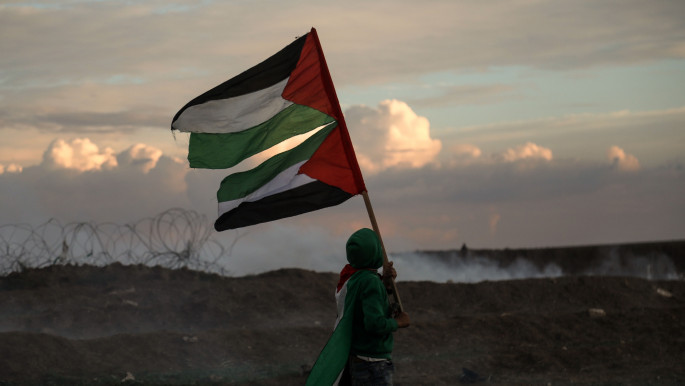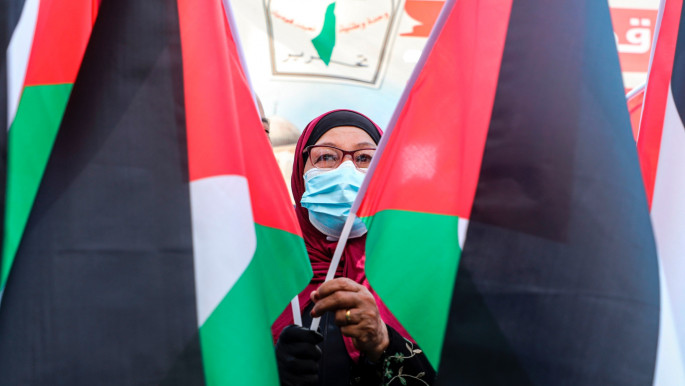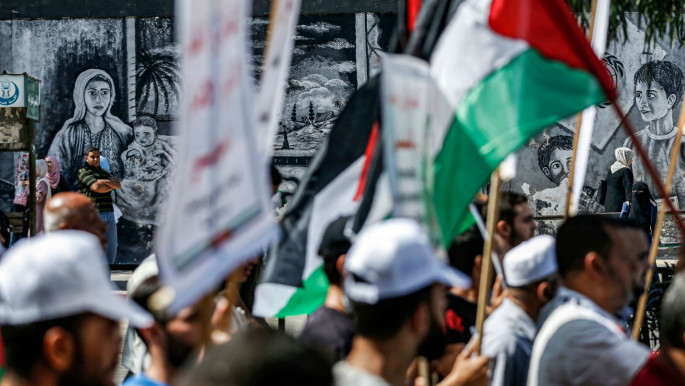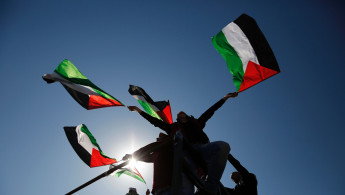How the Arab League failed Palestine
Last month, in failing to pass a resolution condemning Abu Dhabi's formalisation of ties with Tel Aviv, the pan-Arab body effectively negated its support for both the Palestinian right to statehood and the Arab Peace Initiative.
The Saudi-proposed plan was endorsed by the Arab League in 2002 during the height of the Second Intifada and offered Israel normalised ties with Arab countries in return for a Palestinian statehood deal and full Israeli withdrawal from territory occupied since 1967.
The initiative, which received further backing at a 2007 Arab League summit, set a benchmark for normalised ties conditioned on ending the occupation – but the UAE broke this Arab consensus when it announced a bilateral accord with Israel in August.
Following the deal between Abu Dhabi and Tel Aviv, the Palestine Liberation Organisation (PLO) called for an emergency session of the Arab League. Several Gulf countries objected to the demand, stating that it could be discussed during a regular session.
 |
Palestinians have decried the Arab League's ineffectiveness after it failed to take any action to confront or condemn recent normalisation agreements |  |
When a virtual meeting eventually took place on 9 September, the PLO presented a resolution calling for the condemnation of the UAE-Israel deal. The statement had been deliberately toned down in the hope that it would garner more Arab support, but the effort was in vain.
The statement was voted down and in the end several countries sought provisions to give legitimacy to the normalisation of relations with Israel. Bahrain, which had objected to the wording of the Palestinian draft, normalised ties with Tel Aviv just days after the meeting.
 |
|
| Read more: How the Israel-UAE alliance formalises new fault lines in the Middle East |
The Palestinian leadership said that normalisation will come at the expense of their rights and will empower Israel, entrench the occupation and facilitate the ongoing colonisation and de facto annexation of the Palestinian territories.
Financial aid to Palestine suspended
The Arab League, dominated by Saudi Arabia and the UAE, has also tightened the financial noose on Palestinians, a move in line with the Trump administration's own economic war on the Palestinian Authority to pressure it to accept a peace plan composed of isolated Bantustans in the occupied West Bank.
Arab countries have long pledged at various league summits to provide a financial safety net for Palestinians when they are in need, but have frequently failed to live up to their promises.
In May, the PA suspended all agreements with Israel in response to plans to annex parts of the occupied West Bank. The decision led to a standoff over the transfer of tax revenues Israel collects on behalf of the PA. The tax transfers, collected on Palestinian imports and exports, amount to an estimated $200 million each month and represent over 60 percent of the PA's budget.
 |
Arab countries have long pledged to provide a financial safety net for Palestinians, but have frequently failed to live up to their promises |  |
Facing a financial crisis, the PA headed to the Arab League to ask for the promised financial safety net to be activated, but to no avail. The Palestinian leadership then sent a letter to the Arab League asking instead for loans with interest that would be paid back after the financial standoff with Israel ended. Palestinian officials say that the letter wasn't even circulated among member states.
The rejection was an indication of the domination of the Saudi-UAE axis in the Arab League, whose political interests currently align more with Israel and US positions than those of the wider Arab world.
Furthermore, since March, Arab countries, including Saudi Arabia, have halted their monthly financial payments to the Palestinians, under pressure from the Trump administration.
 |
|
| Read more: Israel normalisation deals reflect the rupture between repressive regimes and Arab societies |
Arab countries have for decades contributed financially to the Palestinian budget every month in accordance with decisions made at Arab League summits. Historically, Saudi Arabia and Algeria are the Palestinians' biggest supporters. Currently, the only country that still regularly provides financial support is Algeria.
Faced with these challenges, especially on the normalisation front, some political factions as well as ordinary civilians have called on the leadership to withdraw from the Arab League, citing its ineffectiveness and even complicity in normalisation with Israel.
In a move aimed to protest the agreements with Israel and the Arab League's failure to confront them, the Palestinian foreign minister announced in late September that Palestine had decided to resign from the rotating presidency of the Council of the Arab League. Palestine had been scheduled to chair Arab League meetings for the next six months.
 |
The Palestinian cause has struggled for decades to gain representation within the Arab and international arena |  |
Despite this, the PLO made it clear that it doesn't intend to withdraw from the Arab League altogether, a move described as potentially reckless and counter-productive by Palestinian officials. Instead, Palestinian officials see their place inside the pan-Arab body, where they can try to prevent the normalisation project from going entirely unchallenged or adopted officially by the organisation.
 |
|
| How the Saudi-UAE axis helped Israel defeat Palestinians and encourage normalisation at the Arab League |
Another major reason to stay in the Arab League is the fear on the part of the Palestinian leadership that any withdrawal could create a vacuum exploited by Gulf countries to install an alternative 'representation' in its place, namely Mohammed Dahlan, an exiled former Fatah strongman and adviser to the UAE's Mohammed bin Zayed.
Multiple media reports in recent years have suggested that Saudi Arabia and the UAE, with the help of the Trump administration, want to promote Dahlan as an alternative to Mahmoud Abbas.
Notwithstanding this concern, the Palestinian cause has struggled for decades to finally gain representation within the Arab, and, later, international arena. Indeed, it took many long years before the PLO was recognised as the sole legitimate representative of the Palestinian people.
It is this representation and recognition that has for decades enabled the Palestinian national movement to confront political obstacles, the latest being the Trump administration's so-called peace plan.
Any withdrawal from these bodies, including the Arab League, would simply allow regional and regionally backed powers a claim to speak on behalf of Palestinians, while engaging in projects that undermine their demand for freedom.
The author is writing anonymously to protect their identity



